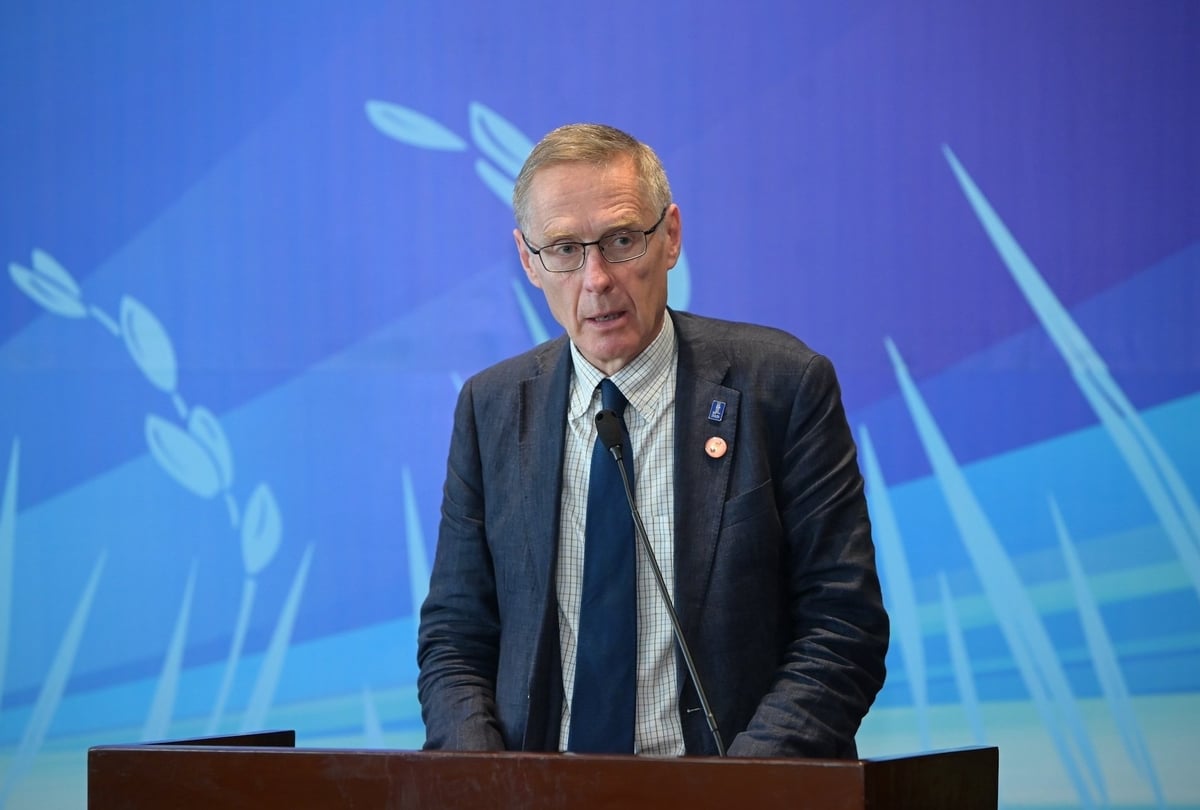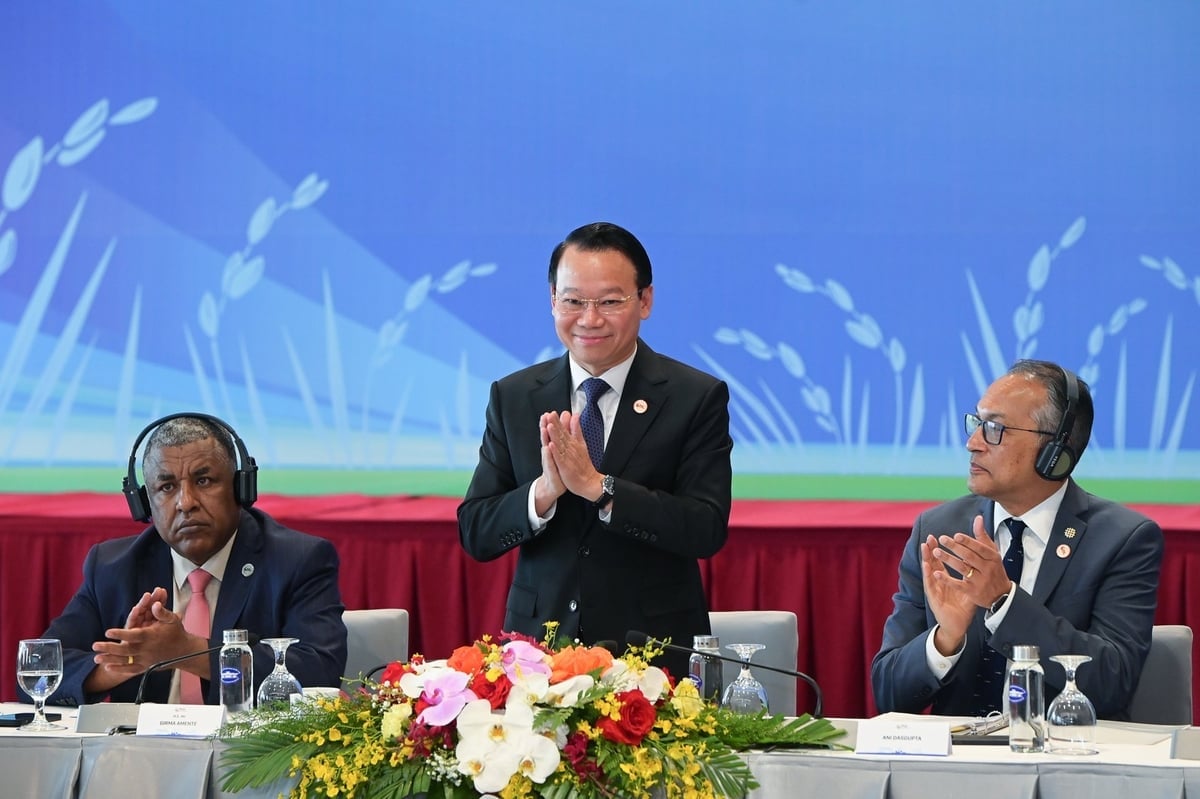May 19, 2025 | 23:04 GMT +7
May 19, 2025 | 23:04 GMT +7
Hotline: 0913.378.918
May 19, 2025 | 23:04 GMT +7
Hotline: 0913.378.918

IFAD Vice President Donal Brown spoke at the Ministerial Session “Riding with the Green Revolution 4.0: The Journey of Transforming the Food System for a Sustainable Era”. Photo: Tung Dinh.
At the ministerial session titled "Riding with the Green Revolution 4.0: The Journey of Transforming the Food System for a Sustainable Era", held as part of the P4G Summit on the morning of April 17, Donal Brown, Vice President of the International Fund for Agricultural Development (IFAD), emphasized the pivotal role of the Minister of Agriculture and Environment in leading the transformation of Vietnam’s food systems.
According to the IFAD leader, the theme "Riding with the Green Revolution 4.0" is more than a call for innovation; it is a call for action, vision, and leadership in the face of unprecedented challenges. Agriculture stands at the crossroads of some of the most pressing global issues: climate change, food insecurity, rural poverty, and population growth. Yet, it also holds the key to solutions. With the right approaches, we can feed a growing population, protect our natural resources, and contribute to building resilient livelihoods for the millions who depend on agriculture.
"Vietnam's Ministry of Agriculture and Environment is uniquely positioned to lead the transformation efforts, turning ideas into impactful actions. Macro-level transformation begins with small changes, rooted in the familiar rhythms of Vietnam’s production and everyday life,” said Brown.
He cited the alternate wetting and drying (AWD) irrigation technique, which the Ministry has standardized as a high-quality, low-emission rice cultivation method. While AWD has now been adopted in many rice-growing countries in Asia as a smart agricultural solution, Vietnam holds an advantage due to its long-standing tradition of irrigation practices. For Brown, this represents a model of innovation built on cultural habits and the country’s socio-economic realities.
IFAD Vice President hoped that under Minister Do Duc Duy's leadership, the Ministry of Agriculture and Environment will continue shaping policies that drive innovation and sustainable agricultural development.

IFAD placed high expectations on Minister Do Duc Duy. Photo: Tung Dinh.
Producing more with fewer resources is a pressing challenge facing many countries, and technology is proving to be the most optimal solution. The application of biotechnology can help develop crop varieties with stronger resilience to climate change. Smart water and soil management systems not only minimize losses but also safeguard ecosystems.
At the same time, policies must be inclusive, ensuring that smallholder farmers, especially women and youth, are not left behind in this transformation journey. Such strategic policies will lay the foundation for a future where farmers can adapt, innovate, and thrive.
“We need policies that invest in research and development for climate-smart agriculture, fostering an environment where new ideas can flourish. We need policies that incentivize the adoption of green technologies that reduce emissions and improve resource efficiency, making sustainability a priority in every farming decision. And we need policies that ensure inclusivity, so small-scale farmers, especially women and youth, are not left behind in this transformative journey,” Mr. Brown emphasized.
However, he acknowledged that no individual or organization can transform the entire food system on their own.
Therefore, IFAD is committed to working alongside governments and partner organizations to transfer technology and knowledge to rural areas, ensuring that innovative solutions truly reach the communities that need them most.
Beyond technical solutions, strong political will and decisive investment are also required to turn effective solutions into the new standard for agriculture. The Green Revolution 4.0 is not simply a story of technological advancement. It is also about empowering people, protecting the planet, and upholding the promise that no one will be left behind.
"Technology is not just a tool - it is a game-changer,” the IFAD representative stressed and added, “We are committed to working together with governments and organizations to transfer technology and knowledge to rural areas, ensuring that innovative practices reach the farmers who need them most. We are working to build farmers' capacity, enabling them to adopt and adapt innovations that can uplift their communities."
P4G Summit (Hanoi, April 15-17, 2025), themed "Sustainable and people-centered green transition,” is the largest multilateral high-level event on green growth hosted by Vietnam in the 2021-2026 period. Vietnam Agriculture and Nature Newspaper (VAN) will update regularly Vietnam's strong commitments, proactive role and international responsibility at the P4G Summit.
Translated by Kieu Chi

(VAN) This was the assessment shared by experts at the workshop titled 'Assessing the Role and Potential of Low-Emission Rice Production Systems in Vietnam,' held on the morning of May 19.

(VAN) Cai Rong Port is the fisheries control center of Quang Ninh, helping to monitor fishing vessels, combat IUU fishing, and remove the EC's 'yellow card'.

(VAN) The German Agricultural Society (DLG) explores the possibility of establishing a mechanization service center in Vietnam’s Mekong Delta to support farmers in accessing and utilizing advanced machinery.

(VAN) On May 16, the Department of Water Resources Management, in collaboration with the Food and Agriculture Organization of the United Nations (FAO), held a signing ceremony for the GEF-8 project document.

(VAN) Food safety, mechanization, vocational training, and market opening are key areas of cooperation expected between the Vietnamese Government and the Federal Republic of Germany.

(VAN) Deputy Minister Nguyen Quoc Tri also expressed his hope that Cuba will soon overcome its current challenges, attain food security, and further expand cooperation with Vietnam.

(VAN) The project contributes to enhancing the resilience of communities vulnerable to the impacts of climate change, with a primary focus on local women.